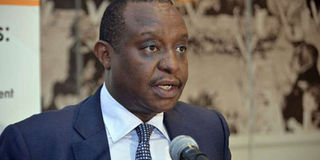Budget Day to come early as polls beckon

National Treasury Cabinet Secretary Henry Rotich addresses journalists at the Stanley Hotel on November 8, 2016. The budget will be presented before MPs earlier than usual. PHOTO | SALATON NJAU | NATION MEDIA GROUP
What you need to know:
- The government is expected to increase its allocation to the Health ministry in the Supplementary Budget to accommodate a 40 per cent pay increase it recently offered to striking doctors.
- MPs, who will resume their sittings Tuesday afternoon, are likely to be away from the House between April 13 and 27, when political parties are expected to hold nominations.
- IEBC’s recurrent expenditure for the current year will be increased by Sh2 billion and that for development reduced by Sh213.6 million.
This year’s national budget will be presented to Parliament two months earlier than usual as the country prepares for the General Election in August.
The government is expected to increase its allocation to the Health ministry in the Supplementary Budget to accommodate a 40 per cent pay increase it recently offered to striking doctors.
National Assembly Majority Leader Aden Duale said Monday that Parliament has written to Treasury Cabinet Secretary Henry Rotich laying out its plans for the Budget.
“We have already passed the Budget Policy Statement, printed the Division of Revenue Bill and we expect the minister to read the Budget in the first or the second week of April,” Mr Duale said.
MPs, who will resume their sittings Tuesday afternoon, are likely to be away from the House between April 13 and 27, when political parties are expected to hold nominations.
With campaigns for the nominations expected to intensify in March, most MPs are likely to miss sittings.
Mr Duale said the Budget estimates are expected to be submitted to Parliament by Tuesday next week, and thereafter handed to the departmental committees and the Budget and Appropriations Committee by end of April.
Mr Duale said the Government would be making “serious adjustments” to the Supplementary Budget estimates submitted late last year to accommodate the proposed increase in doctors’ pay.
“We are going to factor in the doctors’ agreement for 40 per cent, the money for the nurses and the Sh1.6 billion for drought,” he said, adding that the Government is keen on having the Independent Electoral and Boundaries Commission sufficiently funded in readiness for the August 8 election.
IEBC’s recurrent expenditure for the current year will be increased by Sh2 billion and that for development reduced by Sh213.6 million.
The Majority Leader said Treasury had not given the total figure for the doctors’ pay rise but the Government was unlikely to raise it beyond the 40 per cent offer.
In the Supplementary Budget estimates submitted to the National Assembly, the Health ministry’s budget for recurrent expenses has been increased by Sh464.96 million while that for capital expenditure has been reduced by Sh281 million.
The doctors’ strike enters its seventh week today as county governments warn of sackings and union heads risk being jailed on Thursday for contempt of court after they failed to call off strike.
The government has insisted that the Collective Bargaining Agreement of 2013, which the doctors are insisting on, cannot be implemented since it did not have the input of the Salaries and Remuneration Commission.
FINANCE BILL
After he presents the Budget statement, Finance Cabinet Secretary is expected to submit to the House the Finance Bill, through which the government will implements changes to tax laws.
The Bill is required to be passed within 90 days of its presentation, meaning there could be a small number of MPs interested in what is going on in Parliament when it is considered or it might have to be pushed to the next Parliament if sittings are adjourned after Budget is approved.
Also on the table will be another shocker for banks as Kikuyu MP Kimani Ichung’wa prepares a law to restrict public bodies to hold accounts with banks where the Government has a stake and to invest surplus money in Treasury bills and bonds.
Mr Ichung’wa, who is also the vice chairman of the Public Investments Committee, said his Bill is based on the experience with the Youth Enterprise and Development Fund.
PIC established in the course of investigations that the Fund used to have Sh400 million kept in a fixed deposit account at Chase Bank.
Rather than lend the money to the youth, which is its core function, the Youth Fund would collect the interest on the deposit in circumstances deemed improper.
Mr Ichung’wa’s proposal would mean that this does not happen.
It also means that when the government requires money for emergencies or for operational costs, it could negotiate to borrow from the banks in which it has a stake at lower interest rates.





